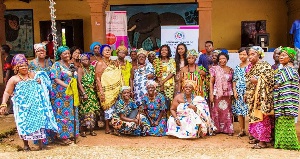Queen Mothers in Kpando Traditional Area in the Volta Region have embraced Menstrual Hygiene campaign launched by Touching The Lives of Girls Foundation (TLGF) to ensure girls in their menstrual periods stay in school.
A baseline data by the Foundation showed that 52 per cent of Ghanaian girls aged 13 to 20 stayed out school for at least one week when they were in their menstrual cycle due to lack of sanitary pads and guidance and counselling services by parents and teachers.
Nana Ama Adutwumwaa, the Chief Executive Officer of TLGF, told the Ghana News Agency on Monday that the situation was adversely affecting reproductive health and education of the girl child, compelling the Foundation to unveil a national education campaign in 2016.
She said a mini durbar was therefore organised by the organisation in Kpando for over 1,000 girls where Queen Mothers of the Akpini Traditional Area declared their support for nationwide Campaign.
“There is the need for a concerted national effort to deal with this problem since it disrupts the education of our young girls and adversely impacts on the reproductive health of the future generation,” she said.
“When a girl has a period for the first time, it is a distinct step into womanhood,” she added: “but, the challenge is, most of us go through our periods very secretively and don’t really bother to figure out if our practices are hygienic or not.”
“At times, we may wear the same for a whole day; as a big ‘sister’, l am here to share some tips as l have done with other girls throughout Ghana to help you stay clean and hygienic during your periods, increase your attention span during lessons and increase general attendance to school.”
Dr Mamaga Agbalisi IV, the Mamaga of Traditional Area, was quoted in a statement to the GNA as saying the importance of menstrual hygiene issues should not be understated and pledged, on behalf of the Queen Mothers, their full support for the campaign.
The over 1,000 girls were invited to her palace at Kpando in an attempt to break the myth that a woman should not bathe during her menstrual periods. She explained: “This myth was based on the fact that in the olden days women had to bathe in the open or in common water bodies like a river or lake. But these days, having a bath are the best thing you can do for your body during your periods.”
“Bathing does not only cleanse your body, but also gives you a chance to clean your private parts well.”
Mr Fred Kyei, TLGF Strategist, also told the GNA in an interview on Monday that similar fora had been organised for girls in the Junior and senior secondary schools in Kpando, where a medical officer, Dr Israel Agbevor, offered professional advice and answered questions by the students and pupils.
He said menstrual hygiene had become serious because the Ghana Education Service unit responsible for the girl child could only reach out to very few schools to counsel girls and there were more male teachers than females, which usually made it difficult for girls in their menstrual periods who needed sanitary pads or panties to approach.
He cited in one of the fora, where one Madam Elizabeth Nakotey, a Senior Public Health Nurse, had to advise girls to often discard their used sanitary towels properly, bath at least two times daily and wash their hands with soap and running water after discarding the pads.
“It is essential to discard your used sanitary pads properly because they are capable of spreading infections. Wrapping it well before discarding it ensures that the smell and infection is contained.”
Girls were being advised to avoid flushing their pads in water closet toilets since they could form blockages and cause the toilet to back up. Girls have also been told to wash their hands well after discarding their used napkins.
Mr Kyei also quoted the Member of Parliament for Kpando Constituency, Mrs Dela Sowah, as having identified herself with the campaign and pledged to begin a process of introducing a bill in parliament to drive the campaign further.
General News of Tuesday, 15 May 2018
Source: ghananewsagency.org

















